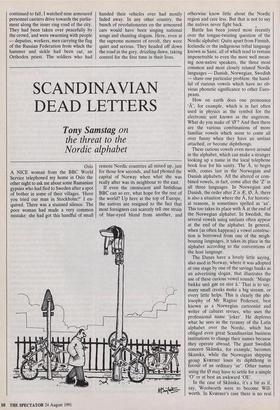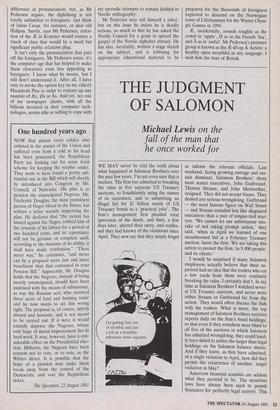SCANDINAVIAN DEAD LETTERS
Tony Samstag on
the threat to the Nordic alphabet
Oslo A NICE woman from the BBC World Service telephoned my home in Oslo the other night to ask me about some Rumanian gypsies who had fled to Sweden after a spot of bother in some of their villages. 'Have you tried our man in Stockholm?' I en- quired. There was a stunned silence. The poor woman had made a very common mistake: she had got this handful of small remote Nordic countries all mixed up, just for those few seconds, and had phoned the capital of Norway when what she was really after was its neighbour to the east.
If even the omniscient and fastidious BBC can so err, what hope for the rest of the world? Up here at the top of Europe, the natives are resigned to the fact that most foreigners can scarcely tell one strain of blue-eyed blond from another, and otherwise know little about the Nordic region and care less. But that is not to say the natives never fight back.
Battle has been joined most recently over the tongue-twisting question of the Nordic alphabet. Quite apart from Finnish, Icelandic or the indigenous tribal language known as Sami, all of which tend to remain impenetrable to even the most well mean- ing non-native speakers, the three most common and most closely related Nordic languages — Danish, Norwegian, Swedish — share one particular problem: the hand- ful of curious vowels which have no ob- vious phonetic significance to other Euro- peans.
How on earth does one pronounce 'A', for example, which is in fact often used in physics as the symbol for the electronic unit known as the angstrom. What do you make of '0'? And then there are the various combinations of more familiar vowels which seem to come all over funny when they have an umlaut attached, or become diphthongs.
These curious vowels even move around in the alphabet, which can make a stranger looking up a name in the local telephone book fear for his sanity. The A, to begin with, comes last in the Norwegian and Danish alphabets. All the altered or com- bined vowels, in fact, come after the 'Z' in all three languages. In Norwegian and Danish, the order after Z is .1E, 0, A; there is also a situation where the A, for historic- al reasons, is sometimes spelled as `aa'. This too takes its place with A at the end of the Norwegian alphabet. In Swedish, the several vowels using umlauts often appear at the end of the alphabet. In general, when (as often happens) a vowel construc- tion is borrowed from one of the neigh- bouring languages, it takes its place in the alphabet according to the conventions of the host language.
The Danes have a lovely little saying, also used in Norway, where it was adopted at one stage by one of the savings banks as an advertising slogan, that illustrates the use of these curious vowel sounds: 'Mange bmkke smA Or en stor a.' That is to say, many small creeks make a big stream, or every little helps. This is clearly the phi- losophy of Mr Ragnar Pedersen, best known as a Norwegian cartoonist and writer of cabaret revues, who uses the professional name 'joker'. He deplores what he sees as the tyranny of the Latin alphabet over the Nordic, which has obliged even great Scandinavian business institutions to change their names because they operate abroad. The giant Swedish concern SkAnska, for example, becomes Skanska, while the Norwegian shipping group Kveerner loses its diphthong in favour of an ordinary 'ae'. Other names using the 0 may have to settle for a simple `0' or at best an awkward 'OE'.
In the case of Skanska, it's a bit as if, say, Woolworth were to become Will- worth. In Kvxrner's case there is no real difference in pronunciation: but, as Mr Pedersen argues, the diphthong is not totally unfamiliar to foreigners. Just think of Julius Cmsar, for instance, or dear old CEdipus. Surely, says Mr Pedersen, reten- tion of the IE in Kvmrner would restore a touch of class that would be a small but significant public relations plug.
It isn't only the pronunciation that puts off the foreigners, Mr Pedersen notes: it's the computer age that has helped to make these characters even less appealing to foreigners. I know what he means, but I still don't understand it. After all, I have only to stroke the option key on my elderly Macintosh Plus in order to conjure up any number of /Es, Os or As. And yet, not one of my newspaper clients, with all the billions invested in their computer tech- nologies, seems able or willing to cope with my sporadic attempts to remain faithful to Nordic orthography.
Mr Pedersen may call himself a joker, but on this issue he insists he is deadly serious, so much so that he has asked the Nordic Council for a grant to spread the gospel of the Nordic alphabet abroad. He has also, inevitably, written a stage sketch on the subject, and is lobbying for appropriate educational material to be prepared for the thousands of foreigners expected to descend on the Norwegian town of Lillehammer for the Winter Olym- pic Games in 1994.
incidentally, sounds roughly as the vowel in 'apple', 0 as in the French 'feu', and A as in 'awful'. Mr Pedersen's pressure group is known as the /E-0-og-A Action: a healthy open mouthful in any language. I wish him the best of British.



















































 Previous page
Previous page